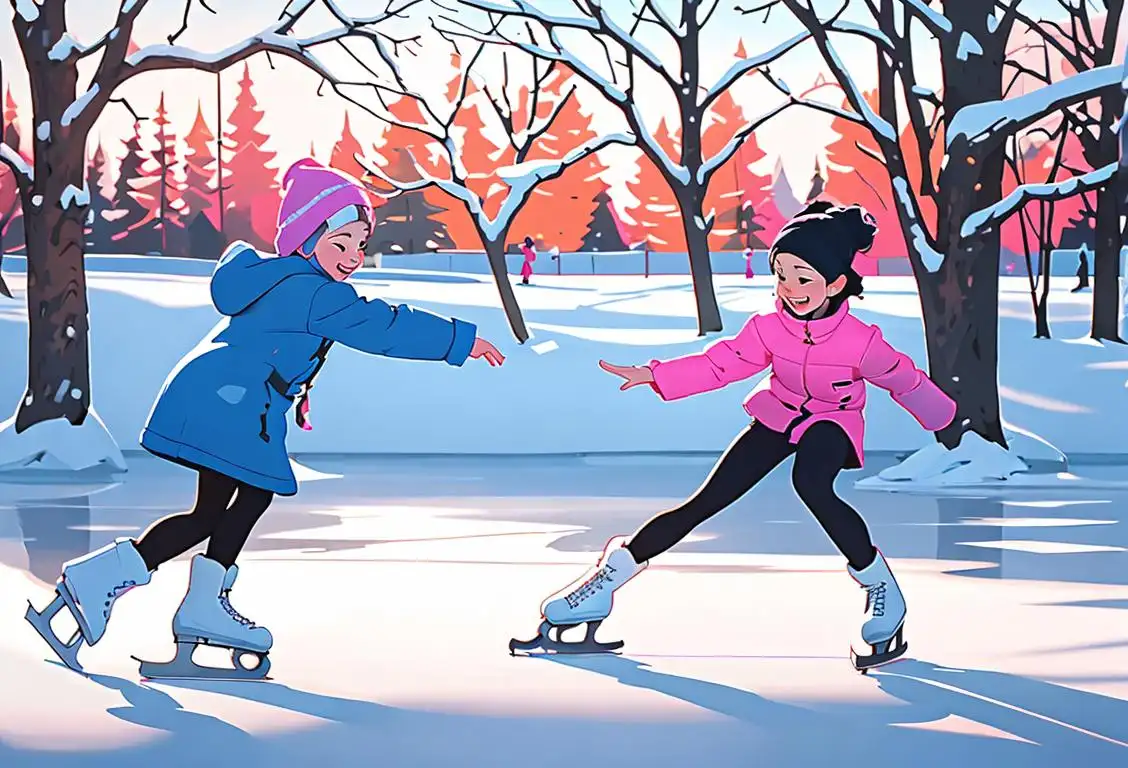National Ice Skating Day

Hey there, fellow ice-skating enthusiasts! It's time to lace up those skates and take a spin on the ice because National Ice Skating Day is upon us!
When is Ice Skating Day?
It's national ice skating day on the 4th December.
A Brief History of Ice Skating Day
Ice skating has been bringing joy and exhilaration to people for centuries. Whether you're channeling your inner Olympic figure skater or just trying to avoid face-planting on the ice, this beloved winter pastime has a rich history worth exploring.
The origins of ice skating can be traced back to ancient times, when people in northern climates would fashion primitive skates out of animal bones and slide across frozen lakes and rivers. The first known ice-skating rinks were created in the 18th century, and the sport gained popularity among the elite classes. It wasn't until the mid-19th century that the first ice-skating clubs were formed, allowing more people to participate and enjoy this icy pursuit.
In the age of the internet, Ice Skating Day has taken on a whole new level of excitement. Social media platforms buzz with videos of impressive jumps, graceful twirls, and the occasional hilarious wipeout. It's a day to celebrate the joy, challenges, and all the funny moments that come with strapping on a pair of ice skates.
History behind the term 'Ice Skating'
3000 BCE
Early Origins in Ancient History
Ice skating has its roots in ancient history, with the earliest evidence of people using ice skates dating back to 3000 BCE in Finland. These early skates were made from sharpened bone and were used for practical purposes like hunting and transportation on frozen lakes and rivers. It is believed that the early Finnish skates were also used for recreational purposes, as cave paintings depict people gliding on ice.
1200s
Steel Blades and Dutch Innovations
In the 1200s, ice skating started to evolve with the introduction of steel blades. Iron blades were attached to wooden platforms, giving skaters better control and allowing them to glide more smoothly. The Dutch played a significant role in advancing the sport, as their flat landscapes froze during winters, providing a perfect canvas for ice skating. They began using the newly developed steel blades and further refined the design by introducing curved blades in the 13th century.
1612
First Official Ice Skating Club
Ice skating grew in popularity throughout Europe, and in 1612, the first official ice skating club, known as The Skating Club of Edinburgh, was formed in Scotland. This marked a pivotal moment in the history of ice skating as it brought together enthusiasts who could share their knowledge and skills. The club organized races, and the sport started gaining recognition as a competitive activity.
1763
Introduction of Figure Skating
The 18th century witnessed the emergence of figure skating as a distinct discipline within ice skating. In 1763, a British lieutenant named Robert Jones published a treatise titled 'A Treatise on Skating,' which introduced detailed diagrams and descriptions of various figure skating moves. This work laid the foundation for the development of figure skating as a highly technical and artistic sport.
19th Century
Ice Skating Becomes a Popular Pastime
During the 19th century, ice skating gained widespread popularity. The introduction of indoor ice rinks, like the Glaciarium in London in 1876, made the sport accessible year-round and attracted larger audiences. Ice skating became a social activity, especially among the upper classes, who organized grand ice skating parties and masquerades.
1924
Inclusion in the Winter Olympics
In 1924, ice skating took a significant leap forward when it became part of the Winter Olympics. Figure skating and speed skating were introduced as official medal events, cementing ice skating's status as a competitive sport on the world stage. Since then, ice skating has captivated audiences worldwide with its graceful and daring performances.
Did you know?
Did you know that the largest ice-skating rink in the world is located in Ottawa, Canada? It spans over 7.8 kilometers (4.8 miles) and attracts thousands of skaters each year!Tagged
romance fun sportsFirst identified
4th December 2015Most mentioned on
4th December 2015Total mentions
33Other days
Believe Day
Action Day
Family Day
Suicide Prevention Month Day
Happiness Day
Opposite Day
Awareness Day
One Day
Dance Day
Full Day









